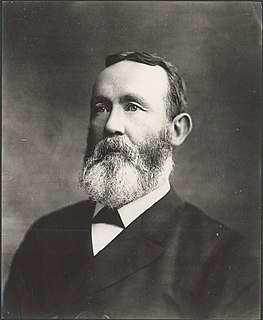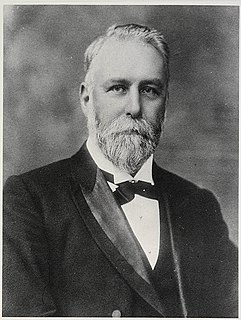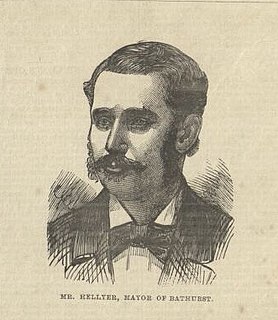Related Research Articles

Bourke was an electoral district of the Legislative Assembly in the Australian state of New South Wales from 1880 to 1904, including the towns of Bourke and Cobar. It elected two members simultaneously between 1882 and 1889 increasing to three members until 1894, with each elector being able to vote for as many candidates as there were vacancies.

Sir Joseph Palmer Abbott, was an Australian politician, pastoralist and solicitor.

William Francis Schey (1857–1913) was an Australian politician.
The third Parkes ministry was the nineteenth ministry of the Colony of New South Wales, and was led by Sir Henry Parkes in a coalition with Sir John Robertson. It was the third of five occasions that Parkes was Leader of the Government.

Francis Augustus Wright was a merchant sailor, gold miner, carrier and member of the Parliament of New South Wales.

John Davies , was a member of the Parliament of New South Wales.

John Sutherland was a builder and politician in colonial New South Wales.

John Fitzgerald Burns was an Australian politician, member of the Parliament of New South Wales, Postmaster-General in the 1870s and Colonial Treasurer in the 1880s.

Louis Francis Heydon was a politician and solicitor in New South Wales, Australia and was Minister of Justice for six weeks 1885 to 1886.

John Beveridge, JP was a New South Wales businessman, sportsman and local government politician, who served as an Alderman (1886–1891) and Mayor of Redfern (1891).

(James) Peter Howe was an Australian politician and convict.
Frederick Jamison Gibbes was an Australian politician.

Thomas Michael Williamson was an Australian politician.

John Harris was an Irish-born Australian politician.

Thomas Henry Hellyer was an Australian politician and solicitor.
A by-election was held for the New South Wales Legislative Assembly electorate of Upper Hunter on 15 April 1861 because of the resignation of John Robertson. Roberston had resigned as Premier on 9 January 1861 to concentrate on the passage of the Robertson Land Acts, which would open up the free selection of Crown land. The bills were passed by the Legislative Assembly on 26 March 1861, and Robertson resigned to be appointed to the Legislative Council to ensure their passage into law.
A by-election was held for the New South Wales Legislative Assembly electorate of East Macquarie on 19 January 1882 because Edmund Webb resigned to accept appointment to the Legislative Council.
Redfern, an electoral district of the Legislative Assembly in the Australian state of New South Wales, has had two incarnations, the first from 1880 to 1920, the second from 1927 to 1968.
A by-election was held for the New South Wales Legislative Assembly electorate of Wentworth on 23 January 1882 because of the resignation of William Brodribb to accept an appointment to the Legislative Council.
A by-election was held for the New South Wales Legislative Assembly electorate of Redfern on 8 July 1889 because of the death of John Sutherland (Protectionist).
References
- ↑ Cable, K J. "Sutherland, John (1816–1889)". Australian Dictionary of Biography . Melbourne University Press. ISSN 1833-7538 . Retrieved 20 January 2021– via National Centre of Biography, Australian National University.
- ↑ "Mr John Sutherland (1816-1889)". Former Members of the Parliament of New South Wales . Retrieved 20 January 2021.
- ↑ "Summoned to the Legislative Council". New South Wales Government Gazette (567). 29 December 1881. p. 6793. Retrieved 20 January 2021– via Trove.
- ↑ "Writ of election: Redfern". New South Wales Government Gazette (571). 30 December 1881. p. 6891. Retrieved 20 January 2021– via Trove.
- ↑ Green, Antony. "1882 Redfern by-election". New South Wales Election Results 1856-2007. Parliament of New South Wales . Retrieved 20 January 2021.